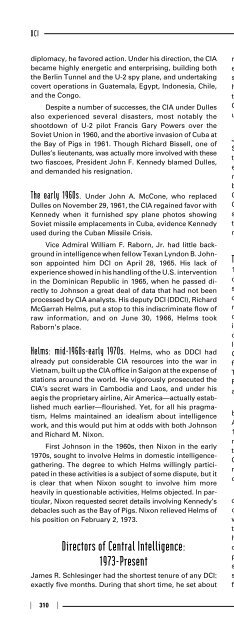ENCYCLOPEDIA OF Espionage, Intelligence, and Security Volume ...
ENCYCLOPEDIA OF Espionage, Intelligence, and Security Volume ...
ENCYCLOPEDIA OF Espionage, Intelligence, and Security Volume ...
Create successful ePaper yourself
Turn your PDF publications into a flip-book with our unique Google optimized e-Paper software.
DCIdiplomacy, he favored action. Under his direction, the CIAbecame highly energetic <strong>and</strong> enterprising, building boththe Berlin Tunnel <strong>and</strong> the U-2 spy plane, <strong>and</strong> undertakingcovert operations in Guatemala, Egypt, Indonesia, Chile,<strong>and</strong> the Congo.Despite a number of successes, the CIA under Dullesalso experienced several disasters, most notably theshootdown of U-2 pilot Francis Gary Powers over theSoviet Union in 1960, <strong>and</strong> the abortive invasion of Cuba atthe Bay of Pigs in 1961. Though Richard Bissell, one ofDulles’s lieutenants, was actually more involved with thesetwo fiascoes, President John F. Kennedy blamed Dulles,<strong>and</strong> dem<strong>and</strong>ed his resignation.The early 1960s. Under John A. McCone, who replacedDulles on November 29, 1961, the CIA regained favor withKennedy when it furnished spy plane photos showingSoviet missile emplacements in Cuba, evidence Kennedyused during the Cuban Missile Crisis.Vice Admiral William F. Raborn, Jr. had little backgroundin intelligence when fellow Texan Lyndon B. Johnsonappointed him DCI on April 28, 1965. His lack ofexperience showed in his h<strong>and</strong>ling of the U.S. interventionin the Dominican Republic in 1965, when he passed directlyto Johnson a great deal of data that had not beenprocessed by CIA analysts. His deputy DCI (DDCI), RichardMcGarrah Helms, put a stop to this indiscriminate flow ofraw information, <strong>and</strong> on June 30, 1966, Helms tookRaborn’s place.Helms: mid-1960s-early 1970s. Helms, who as DDCI hadalready put considerable CIA resources into the war inVietnam, built up the CIA office in Saigon at the expense ofstations around the world. He vigorously prosecuted theCIA’s secret wars in Cambodia <strong>and</strong> Laos, <strong>and</strong> under hisaegis the proprietary airline, Air America—actually establishedmuch earlier—flourished. Yet, for all his pragmatism,Helms maintained an idealism about intelligencework, <strong>and</strong> this would put him at odds with both Johnson<strong>and</strong> Richard M. Nixon.First Johnson in the 1960s, then Nixon in the early1970s, sought to involve Helms in domestic intelligencegathering.The degree to which Helms willingly participatedin these activities is a subject of some dispute, but itis clear that when Nixon sought to involve him moreheavily in questionable activities, Helms objected. In particular,Nixon requested secret details involving Kennedy’sdebacles such as the Bay of Pigs. Nixon relieved Helms ofhis position on February 2, 1973.Directors of Central <strong>Intelligence</strong>:1973-PresentJames R. Schlesinger had the shortest tenure of any DCI:exactly five months. During that short time, he set aboutrevamping the agency, calling for the firing of some 1,000employees <strong>and</strong> compiling a list of agency secrets that hissuccessor would reveal to Congress. For two months afterhis July 2, 1973, departure, the DCI’s position went unfilled;then, on September 4, William E. Colby took leadership.Colby’s was an extremely difficult tenure, as the CIA cameunder intense scrutiny during this time.In a feud with CIA counterintelligence chief JamesJesus Angleton, Colby told New York Times reporterSeymour Hersh of a domestic intelligence campaign, Chaos,that he claimed was Angleton’s brainchild. Colby dideventually relieve the CIA of Angleton, whose hunt formoles in the organization had become a preoccupation,but the revelations to Hersh set off a flurry of suspicions onCapitol Hill. During the latter part of Colby’s tenure, theCIA would come under the scrutiny of multiple congressionalcommittees, <strong>and</strong> Colby would reveal the details ofthe secrets compiled by Schlesinger—a list of misdeedsnicknamed “the Family Jewels”.The late 1970s: Bush <strong>and</strong> Turner. Colby retired on January 30,1976, <strong>and</strong> was replaced by George H. W. Bush. Despite theoverall significance of Bush’s career, his tenure as DCI wasshort—slightly less than one year. Bush did, however, putconsiderable support behind intelligence-gathering technology,<strong>and</strong> the Keyhole satellite program flourished underhis leadership. In the midst of ongoing debates regardingproposals to transfer the Panama Canal to Panamanianoversight, Bush learned of an effort by a Panamanianlieutenant colonel to purchase U.S. intelligence secrets.Given the volatile atmosphere surrounding the Canal transferdebate, Bush opted not to act against the colonel.Twelve years later, as president, he would unseat thePanamanian, Manuel Noriega, who by then was a general<strong>and</strong> dictator of his nation.Bush’s tenure ended on the day James E. Carterbecame president, as Carter had his own choice for DCI:Admiral Stansfield Turner, who took office on March 9,1977. Although Turner was an old Naval Academy classmateof Carter, the two men barely knew one another atthe time of his appointment. In contrast to the early days ofCIA when DCIs tended to be military officers, Turner, whoretired from active duty in December 1978, had been theonly military officer to serve in the position since 1966.Turner continued Bush’s emphasis on intelligencecollection via satellite, <strong>and</strong> favored electronic intelligenceover human intelligence. This preference had much to dowith his desire to distance the agency from its old practices,<strong>and</strong> covert operations declined dramatically underhis leadership. The value of those decisions came in toquestion, however, when the CIA was later in a poorposition to gain <strong>and</strong> analyze intelligence from humansources that could help foresee or intervene in eventssuch as the Soviet invasion of Afghanistan or the Islamicfundamentalist takeover in Iran.310 Encyclopedia of <strong>Espionage</strong>, <strong>Intelligence</strong>, <strong>and</strong> <strong>Security</strong>







![The Big Lie 9-11 and Government Complicity in Mass Murder [PDF]](https://img.yumpu.com/50957077/1/190x245/the-big-lie-9-11-and-government-complicity-in-mass-murder-pdf.jpg?quality=85)








